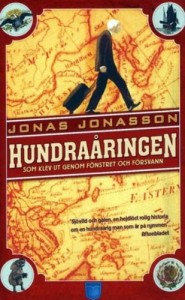 Så har jeg altså endelig også lest om hundreåringen som ‘klev ut genom fönstret och försvann’. Siden boka nærmest er blitt geniforklart i enkelte kretser er jeg ganske fornøyd med at jeg klarte å lese den med relativt åpent sinn. Som regel gjør slik hype at jeg enten ikke klarer å få begynt på ei bok i det hele tatt eller at jeg tror på hypen og blir skuffet fordi boka ikke lever opp.
Så har jeg altså endelig også lest om hundreåringen som ‘klev ut genom fönstret och försvann’. Siden boka nærmest er blitt geniforklart i enkelte kretser er jeg ganske fornøyd med at jeg klarte å lese den med relativt åpent sinn. Som regel gjør slik hype at jeg enten ikke klarer å få begynt på ei bok i det hele tatt eller at jeg tror på hypen og blir skuffet fordi boka ikke lever opp.
Hundraåringen er blitt omtalt som en ‘humrebok’, og humre gjorde jeg. Jeg lo til og med høyt minst en gang. Persongalleriet er (stort sett) sympatisk, det gjelder ikke minst Allan Karlsson – hundreåringen selv – som etter et mer enn gjennomsnittlig begivenhetsrikt liv havner på gamlehjem i en alder av 99 og bestemmer seg for at det nå kan være nok, nå vil han dø. Men det å dø sånn uten videre er ikke så lett, så etter noen måneder, på sin egen hundreårsdag, faktisk, klatrer han altså ut vinduet og begir seg ut på et nytt eventyr.
Halvveis forsøkte jeg å sammenfatte boka for min bedre halvdel, og endte med å karakterisere den som en blanding av en Arto Paasilinna-bok og Forest Gump. Det høres kanskje litt merkelig ut, men det fungerer aldeles utmerket som underholding.
Å andra sidan låg ju Spanien i utlandet, precis som alla länder gjorde, Sverige undantaget, och efter att ha läst om utlandet i hela sitt liv vore det inte så dumt att få uppleva det på riktigt någon gång.
(Side 76) Og der ligger kanskje kjernen i min omtale av boka: Dette er lett underholdning. Visst humrer man, visst finnes det spark til øvrigheta og til A4-livet og visst kan man sikkert dra ut en og annen (om enn ganske banal) livsvisdom av det hele. Men jeg føler liksom ikke at jeg sitter igjen med noe særlig etter endt lesing.
Det er da heller ikke noe krav, så ikke la deg skremme av det. Boka anbefales absolutt som f.eks. ferielektyre, eller som et feelgood avbrekk i hverdagen om du vil.

